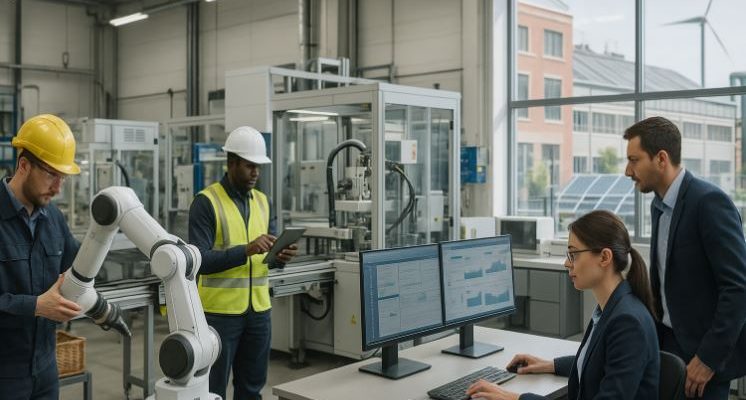
What Innovations Are Transforming British Industries?
Innovation has always been at the heart of Britain’s economic progress, but the pace of change in recent years has accelerated dramatically.
From artificial intelligence and robotics to green energy and financial technology, British industries are experiencing transformation on a scale reminiscent of the Industrial Revolution, only this one is digital, data-driven, and globally interconnected.
As competition intensifies and consumer demands evolve, UK businesses are turning to new technologies and modern thinking to stay resilient, sustainable, and globally relevant.
These innovations are not just enhancing productivity, they are reshaping entire industries and redefining how the nation works, trades, heals, and powers itself.
Below, we explore the major innovations driving this new era of British industrial transformation and how they are preparing the UK economy for the future.
What Innovations Are Transforming British Industries?

Across the UK, industries are undergoing strategic reinvention driven by powerful technologies and shifts in business behaviour.
The transformation is not limited to one sector, it is widespread, affecting manufacturing, finance, healthcare, retail, energy, logistics, and public services.
Innovation has become a competitive requirement. It helps organisations reduce operational costs, improve accuracy, enhance customer experiences, and respond quickly to dynamic market conditions.
The most influential innovations share three characteristics:
- They prioritise efficiency and automation
- They enhance the quality of products and services
- They promote sustainability and long-term resilience
Together, these factors are collectively shaping the UK’s future economy.
How Is Artificial Intelligence Reshaping Traditional and Modern Sectors?
Artificial intelligence has become one of the most disruptive forces in British industries. What began as simple automation has evolved into sophisticated systems capable of learning, predicting, and adapting in real time.
AI as a Strategic Business Partner
Artificial intelligence now enhances operations across numerous UK sectors, including healthcare diagnostics, financial risk analysis, logistics planning, and advanced manufacturing.
AI Is Driving Transformation Through
- Predictive analytics: Helping organisations identify trends, forecast demand, and optimise decision-making.
- Automation of routine tasks: Allowing staff to focus on strategy, customer care, and innovation rather than manual processes.
- Improved customer experiences: With AI-powered chatbots, recommendation engines, and personalised online interactions.
- Smarter healthcare diagnoses: AI systems assist doctors in spotting early-stage illnesses and reviewing scans with greater precision.
AI’s impact will continue to expand as British companies adopt more ethical, transparent, and secure AI frameworks to build trust and enhance efficiency.
What Role Does Automation and Robotics Play in Industrial Efficiency?
Automation and robotics are revolutionising how goods are produced, stored, and distributed across the UK. British factories and warehouses increasingly rely on robotics to speed up production, reduce human error, and maintain consistency.
Automation is especially transformative for industries facing labour shortages. Robotics can handle repetitive, dangerous, or high-precision tasks, allowing human employees to shift toward more strategic and creative responsibilities.
Companies adopting robotics have reported improved productivity, reduced downtime, and stronger safety records.
In sectors like automotive manufacturing, logistics, and pharmaceuticals, robotic systems now enable 24/7 operational models, ensuring continuous output and faster delivery times.
How Are Renewable Technologies Changing the UK’s Energy Landscape?

The UK is undergoing an ambitious transition toward clean, sustainable energy. Innovations in renewable technologies are playing a central role in reducing carbon emissions, lowering household energy costs, and fostering national energy security.
Renewable Innovation Leading the Way
The UK’s commitment to net-zero goals has inspired both large-scale infrastructure projects and cutting-edge research in green technology.
Key Renewable Innovations Transforming the UK
- Offshore wind power: The UK leads Europe in offshore wind capacity, with increasingly powerful turbines boosting national output.
- Hydrogen technology: Green hydrogen is emerging as a clean alternative for powering homes, vehicles, and heavy industry.
- Solar adoption and storage: New solar technologies and home energy storage systems are reducing reliance on fossil fuels.
These innovations are forming a renewable ecosystem that reshapes how the UK generates, manages, and consumes energy.
How Is the UK Embracing Digital Transformation Across Key Industries?
Digital transformation is the backbone of modern British industry. Organisations are adopting cloud technology, digital twins, real-time analytics, and smart infrastructure to stay competitive in an increasingly digital economy.
Cloud-Led Growth and Agile Systems
Cloud adoption has empowered businesses of all sizes to scale operations flexibly, improve cybersecurity resilience, and reduce physical infrastructure costs. Digital twins, virtual replicas of physical systems, allow engineers and designers to simulate performance without expensive prototypes.
Data is becoming a strategic asset. Industries now use real-time analytics to improve customer experiences, reduce waste, strengthen supply chains, and enhance regulatory compliance.
Digital transformation is not a single project, it is an ongoing strategic shift, moving businesses toward more intelligent, automated, and responsive operations.
What Innovations Are Driving Growth in Britain’s Manufacturing Sector?
Manufacturing remains a crucial pillar of the British economy, and innovation is breathing new life into this long-standing industry.
New materials, smart factories, and advanced production technologies are enabling British manufacturers to compete on a global scale.
Smart Factories and Innovative Materials
Manufacturers are leveraging 3D printing, automation, and AI-assisted equipment monitoring to create smarter production environments. These advancements enable companies to produce complex components quickly, reduce waste, and strengthen supply chain resilience.
Robotics plays a central role in modern factories, particularly in precision-based industries like aerospace and medical technology.
Smart factories use sensor data to predict maintenance needs, minimise downtime, and maintain consistent performance without costly interruptions.
How Are Fintech and Digital Banking Shaping the Future of UK Finance?

The UK is widely regarded as a global leader in financial technology. Fintech companies are transforming how people access banking services, how institutions handle payments, and how businesses manage their financial operations.
Open banking has allowed small businesses and consumers to use alternative digital platforms for budgeting, payments, and customised financial services. Blockchain technology is paving the way for more secure transactions, decentralised finance, and improved identity verification.
Innovation in digital banking has made financial services more transparent, inclusive, and user-driven. With the rise of mobile-first banking and advanced fraud-prevention tools, the financial landscape is becoming more responsive and accessible than ever.
How Is Innovation Improving Healthcare and Life Sciences in the UK?
Healthcare innovation is one of the most impactful transformations in British industries. From digital medical records to advanced diagnostics, the NHS and UK health sector are integrating technology to offer higher-quality, faster, and more efficient care.
Breakthroughs in Medical Technology
Cutting-edge tools such as robotics-assisted surgery, genomics, and AI-powered diagnostics are improving patient outcomes and reducing waiting times.
Healthcare Innovation Highlights
- Remote patient monitoring: Wearable tech allows continuous health tracking for long-term conditions.
- Telemedicine services: Digital consultations give patients faster, more convenient access to care.
- Biotech research: New genetic therapies and vaccine technologies are accelerating medical research worldwide.
Together, these innovations are helping the UK stay at the forefront of life sciences and global healthcare advancement.
Why Are Sustainable and Ethical Practices Becoming Innovation Drivers?
Sustainability and ethics are no longer “added values”, they are innovation catalysts. British consumers increasingly choose brands that demonstrate transparency, responsibility, and environmental stewardship.
ESG as a Business Transformation Force
Environmental, Social, and Governance (ESG) principles are inspiring new technological and operational shifts. Businesses are redesigning supply chains, adopting renewable materials, minimising waste, and prioritising social accountability.
Sustainability-driven innovation has become especially important for companies looking to attract investment. Ethical, low-carbon products and services are gaining strong momentum in sectors such as retail, manufacturing, energy, and construction.
As noted by www.londonbusinessinsider.co.uk, sustainability is shaping the future of British competitiveness by encouraging industries to lead with responsibility and long-term thinking.
Conclusion
British industries are undergoing one of the most dynamic periods of transformation in modern history.
Innovation across artificial intelligence, automation, renewable energy, digital infrastructure, healthcare, and finance is redefining both the capabilities and ambitions of UK businesses.
These technological shifts are improving efficiency, strengthening sustainability, and expanding global influence.
As Britain transitions into a more connected, data-driven, and environmentally conscious era, its industrial landscape will continue to evolve, shaped by the founders, engineers, researchers, and policymakers who embrace innovation as an economic engine.
The future of British industry is not merely about technological adoption, it is about adaptability, resilience, and the willingness to lead. Innovation will remain the defining factor that elevates British industries on the world stage.
FAQs
Which industries in the UK are experiencing the most innovation?
AI, fintech, healthcare, manufacturing, and renewable energy sectors are leading the innovation landscape in the UK.
How is automation changing British workplaces?
It reduces manual labour, increases accuracy, and enables 24/7 operations across manufacturing and logistics.
Why is sustainability driving innovation?
Consumers and investors demand responsible practices, pushing businesses to create cleaner and more ethical solutions.
What is the role of AI in British industries today?
AI enhances decision-making, increases efficiency, and strengthens customer services across multiple sectors.
How will future innovations impact the UK economy?
They will boost productivity, create new jobs, enhance competitiveness, and support long-term economic resilience.





